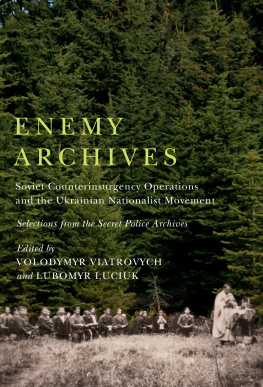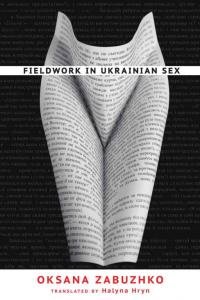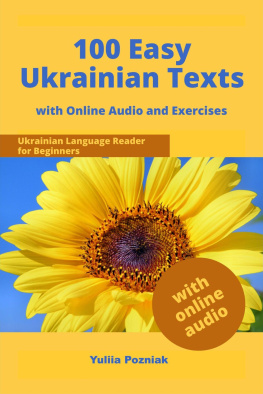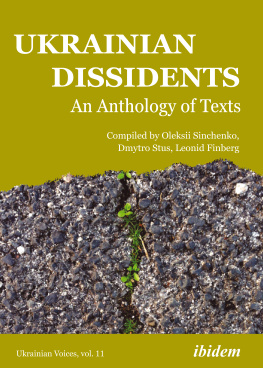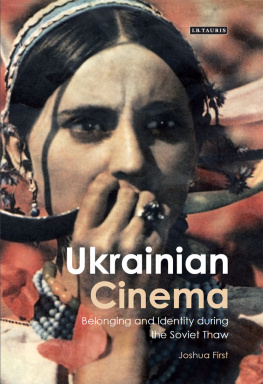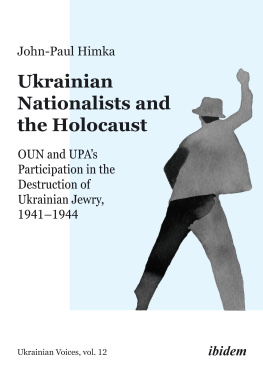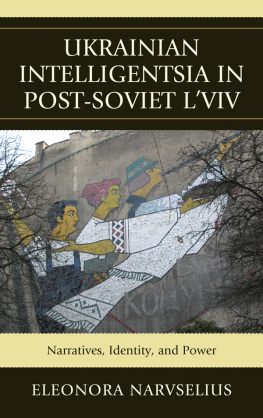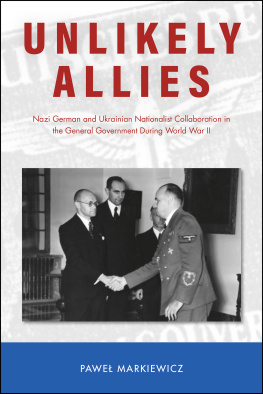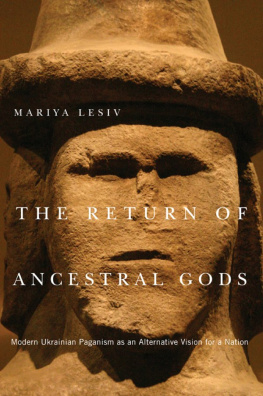Contents
Page List
Guide

ENEMY ARCHIVES
ENEMY ARCHIVES
Soviet Counterinsurgency Operations and the Ukrainian Nationalist Movement
Selections from the Secret Police Archives
Edited by
VOLODYMYR VIATROVYCH and LUBOMYR LUCIUK
Translated by Marta Daria Olynyk
McGill-Queens University Press
Montreal & Kingston London Chicago
Volodymyr Viatrovych and Lubomyr Luciuk 2023
ISBN 978-0-2280-1466-9 (cloth)
ISBN 978-0-2280-1582-6 (ePDF)
ISBN 978-0-2280-1593-2 (ePUB)
Legal deposit first quarter 2023
Bibliothque nationale du Qubec
Printed in Canada on acid-free paper that is 100% ancient forest free (100% post-consumer recycled), processed chlorine free
We acknowledge the support of the Canada Council for the Arts.
Nous remercions le Conseil des arts du Canada de son soutien.
Library and Archives Canada Cataloguing in Publication
Title: Enemy archives : Soviet counterinsurgency operations and the Ukrainian nationalist movement: selections from the Secret Police Archives / edited by Volodymyr Viatrovych and Lubomyr Luciuk; translated by Marta Daria Olynyk.
Names: Viatrovych, Volodymyr, 1977 editor. | Luciuk, Lubomyr Y., editor.
Description: Includes bibliographical references and index. | Documents translated from Russian and the Ukrainian.
Identifiers: Canadiana (print) 20220395578 | Canadiana (ebook) 20220395705 | ISBN 9780228014669 (cloth) | ISBN 9780228015826 (ePDF) | ISBN 9780228015932 (ePUB)
Subjects: LCSH: Orhanizatsiia ukranskykh natsionalistivHistorySources. | LCSH: Ukranska povstanska armiiaHistorySources. | LCSH: Soviet Union. Komitet gosudarstvenno bezopasnostiHistorySources. | LCSH: Secret serviceSoviet Union HistorySources. | LCSH: Intelligence serviceSoviet UnionHistorySources. | LCSH: Anti-communist movementsUkraineSources. | LCSH: Ukrainian resistance movement, 1944-1954Sources. | LCSH: CounterinsurgencyUkraineHistorySources. | LCSH: NationalismUkraineHistorySources.
Classification: LCC DK508.84.E54 2023 | DDC 947.708/4dc23
This book was typeset in Minion Pro.
Contents
follow pages
follow page
Acknowledgments
Over a decade ago, we laid out a series of questions addressing what we felt were the most critical issues associated with academic and public debates over the words and deeds of the Ukrainian nationalist movement before, during, and in the aftermath of the Second World War. For reasons that need not be detailed here, the ensuing project took many years to complete, a frustrating delay that, nevertheless, if quite unexpectedly, proved beneficial for who could have foreseen that, on 24 February 2022, Vladimir Putin would launch the armed forces of the Russian Federation against Ukraine? The genocidal agenda of his legions, seeking the erasure of Ukraine and Ukrainians, was justified as being necessary to ensure the countrys de-Nazification, meaning the elimination of extreme nationalists, specifically Banderivtsi. While Soviet-era propaganda, as is documented in the following pages, routinely portrayed members of the Ukrainian nationalist movement as war criminals, Nazi collaborators, fascists, and so on, a trope regurgitated regularly by the Russian Federation from the collapse of the Soviet Union in 1991 to the present, we did not anticipate this overworked disinformation being deployed as an excuse for starting a large-scale war in twenty-first-century Europe. It now appears as though Putin actually believed the ahistorical notion that Ukrainians are really Russians, coaxed away from some supposedly primordial Russian world by the mendacious machinations of proselytizing Ukrainian nationalists, allegedly carried out at the behest and in the interests of the West. Putins adherence to this delusional ide fixe, and the consequences of his war of aggression, has created a world in which the rules-based international order has been destabilized and the geopolitical architecture of the postCold War era irrevocably undermined. Worse, from the Ukrainian perspective, is how Ukraines infrastructure has suffered catastrophic damage, with millions of people forcibly displaced, even as undeniable evidence of ethnic cleansing, war crimes, and crimes against humanity perpetrated by the Russian invaders exposes their unconscionable goals. Yet, if there can be any hopeful outcome from the horrors of this war, it lies in the fact that not only were Putins troops not welcomed but also, quite dramatically, their incursion was bluntly thwarted by a united Ukrainian nation, one whose tenacious defiance and resistance to Russian imperialism belies the fiction that Ukrainians and Russians are the same people. Careful historians always knew this to be true, but the general public, and particularly elites in the art world, having been inundated with centuries of messaging about a supposedly Great Russian culture, scarcely bothered to consider those differences or how they had been systematically obfuscated by the settler colonial regime that Russia imposed in Ukraine. Now, given the outrages perpetrated by the invasion of Ukraine, the world has a much better understanding of the fact that Ukrainians never were, are not now, and never will be Russians, no matter what mother tongue they speak, their faith or heritage, or where they might live in Ukraine. What is also evident, and of considerable interest to those who delve into this volume, is just how much the worldview of the Ukrainian nationalists of the mid-twentieth century inspired many of those engaged in a just war, defending their shared Ukrainian motherland. Tellingly, this struggle is being waged against a modern-day variant of the very same foe the men and women of the OUN and the UPA challenged decades ago. We never could have predicted just how much contemporary salience our project would acquire ironically, because of the geopolitical fantasies of the KGB man in the Kremlin.
Many people, institutions, and foundations contributed to our efforts over the years. This project was launched when Dr Viatrovych served as director of the Ukrainian Institute of National Remembrance, in Kyiv, where his research was greatly assisted by Volodymyr Birchak, Oleksandr Ishchuk, Ruslana Zabiloho, and Professor Ivan Patryliak. In North America we are particularly grateful to Professor Paul Robert Magocsi of the Chair of Ukrainian Studies at the University of Toronto for his always helpful counsel, cartographic acumen, and unfaltering support of our initiative. We are honoured to be listed among the Fellows of the Chair. We are also most thankful to Marta Daria Olynyk who took on the monumental task of translating hundreds of pages of Sovietera documents into English, making these primary source materials finally accessible to a much wider audience then ever before, a labour with which she diligently engaged.
Of course, we owe a great deal to Richard Ratzlaff, our good-humoured and conscientious editor at McGill-Queens University Press. He shepherded this project to its conclusion even as Joanne Richardson copy-edited this manuscript, and Kathleen Fraser oversaw the whole, a major task indeed. Three anonymous readers provided thoughtful and constructive criticisms that we were grateful to receive. At various stages of our work we received useful advice and assistance from Dan Graham, Gerry Locklin, Nadia Luciuk, Sonia Molodecky, Dr Oleh Romanyshyn, Orest Steciw, Lesia Szwaluk, and Krystina Waler.

